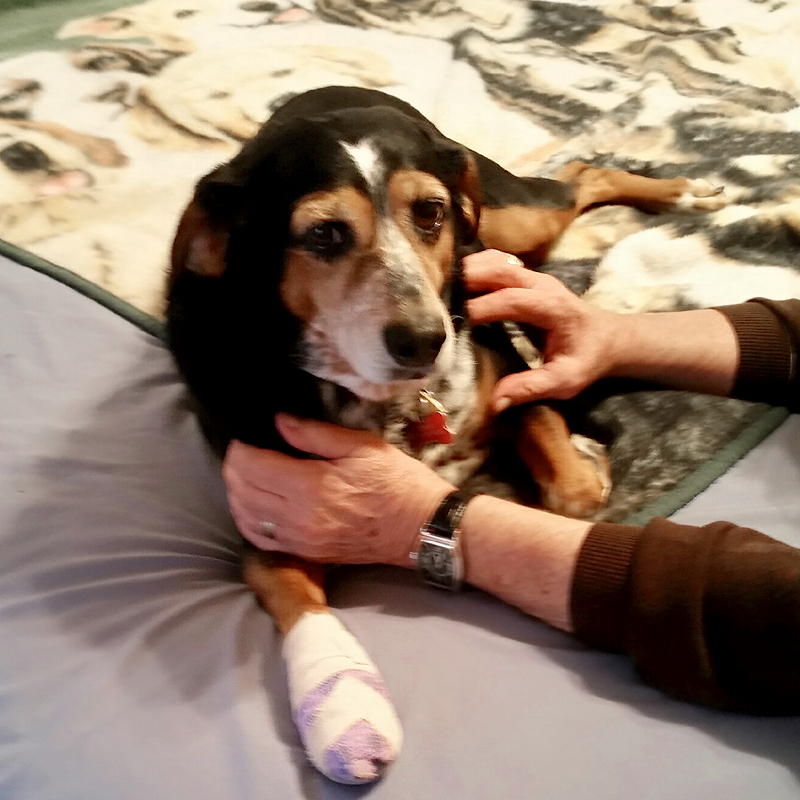Another dog has been fatally attacked in Sussex County and, as in two previous cases, state Office of Animal Welfare officials have declined to provide specific details about the attack and what action has been taken to protect residents and their pets.
In early November, Pot-Nets Bayside resident Patricia Taber was walking her 40-pound blue tick hound on a neighborhood street when a neighbor's dog burst through a screened window and attacked.
“He ripped her throat right out,” Taber said. “I got all bruised up trying to beat the dog off. The dog just wasn't letting go.”
Taber took her mangled dog to Savannah Animal Hospital in Lewes, where, she said, technicians were shocked at the sight of her dog in the back seat.
Taber said she called animal control to report the incident, and she said the veterinary office shared photos of her dog's injuries with the state office as well.
A spokesperson for the Office of Animal Welfare confirmed officers responded to the complaint and that a dog-at-large citation was issued to the offending dog's owner. They declined to provide any additional information or details about the case, and did not file for a dangerous dog hearing. The citation that was issued carries a fine of $25 to $50.
“Nobody seems to want to do anything,” Taber said, adding that every time she's called to find out what officers are doing to ensure a fatal attack does not occur again, the Office of Animal Welfare refuses to share any information.
“All animal control wants is to get her rabies certificate,” Taber said, referring to her deceased dog's rabies records. “They won't give me any information.”
One of the attacking dog's owners, who asked to remain anonymous, said animal control officers initially seized the dog, but they returned it later that night. They said they were not aware of any charges related to the attack, and their efforts to rehome the dog or place it in a shelter have been largely unsuccessful.
According to state law, when a dog inflicts serious physical injury on or kills a dog or a person, animal control officers may pursue a dangerous dog case. A dangerous dog hearing would take place in Justice of the Peace Court 16, where a judge would determine whether evidence shows the dog is too dangerous to remain in a community. Officers did not request a hearing in this case.
However, in another fatal attack in Georgetown, officers have now tried twice to bring a dangerous dog case to court against Moka, a pit bull that killed a neighbor's dog in September and has repeatedly been reported running loose in the neighborhood.
Following the September attack, officers requested a hearing, but a judge ruled they failed to file it within the required 72 hours after identifying Moka's owners. That case, which would have taken a closer look at what happened when Moka killed the neighbor's toy poodle, was dismissed, so evidence in the case was not reviewed in court.
At the end of October, Moka got loose and reportedly charged at another neighbor, prompting animal-control officers to seize her and file for another dangerous dog hearing. An attorney for the Office of Animal Welfare withdrew that case Nov. 21, two days before the scheduled hearing.
Emily Knearl, a spokeswoman with the Department of Health and Social Services, said an investigation found multiple reports concerning the aggressive nature of Moka, but were unable to collect enough specific evidence of previous attacks.
“In consultation with our attorney, the OAW decided to withdraw the case to preserve evidence for future filings,” she said.
Moka's owner, Kevaughn Taylor, still faces two criminal charges for maintaining a dangerous animal and disorderly conduct. Taylor and his mother, Valerie Taylor, own a second dog named D.C., which neighbors say has also attacked neighborhood residents and pets. Valerie Taylor pleaded guilty to one charge of dog-at-large that bites without provocation following a dog attack this summer involving D.C.
Valerie Taylor argues that her neighbors have exaggerated most of the attacks they've reported to both Georgetown police and the Office of Animal Welfare. But after she found out the case against Moka had been dropped, her main concern was getting her dog back.
“They need to bring me my dog back,” she said, voicing frustration that Moka was being held at a shelter in New Castle County, not Sussex. The Office of Animal Welfare contracts Pennsylvania-based Brandywine Valley SPCA to handle shelter services and works with local shelters to temporarily board animals.
While the Office of Animal Welfare has declined to release details during active investigations, a spokesperson previously said a policy for releasing information to the public is in its final stages. Quarterly newsletters providing data on statewide animal-welfare statistics are available at animalservices.delaware.gov/about/reports.
























































